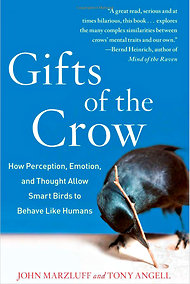The Games Crows Play, and Other Winged Tales
By JAMES GORMAN
Published: June 11, 2012 in New York Times
The extremes of animal behavior can be a source of endless astonishment. Books have been written about insect sex. The antics of dogs and cats are sometimes hard to believe. And birds, those amazing birds: They build elaborate nests, learn lyrical songs, migrate impossibly long distances. But “Gifts of the Crow,” by John N. Marzluff and Tony Angell, includes a description of one behavior that even Aesop never imagined.
“On Kinkazan Island in northern Japan,” the authors write, “jungle crows pick up deer feces — dry pellets of dung — and deftly wedge them in the deer’s ears.”
What!?
I checked the notes at the back of the book, and this account comes from another book, written in Japanese. So I can’t give any more information on this astonishing claim, other than to say that Dr. Marzluff, of the University of Washington, and Mr. Angell, an artist and observer of birds, think that the crows do it in the spirit of fun.
Deer droppings, it must be said, are only one of the crows’ gifts. The authors’ real focus is on the way that crows can give us “the ephemeral and profound connection to nature that many people crave.” To that end, however, they tell some wild anecdotes and make some surprising assertions.
Many of the behaviors they describe — crows drinking beer and coffee, whistling and calling dogs and presenting gifts to people who feed them — are based on personal testimony and would seem to fall into the category of anecdote rather than science.
But the book is also full of clear and detailed accounts of research, with descriptions of the structure of the crow brain and of the various experiments that show the remarkable intelligence of crows and their relatives.
One claim had almost the same effect on me as the deer dung trick.
“Language discovery in a wild animal will not be surprising,” the authors write. “As we scientists become more sophisticated in matching the response of animals to nuances in their vocalizations, we may discover language in cognitive birds and mammals that rivals our own.”
I’m going to go out on a limb and say that the discovery of language rivaling our own in wild animals would be a huge scientific surprise. Many scientists are highly skeptical of some of the existing claims for animal communication, and near-human language would be on another plane altogether.
Discover more from Vermont Birder
Subscribe to get the latest posts sent to your email.

